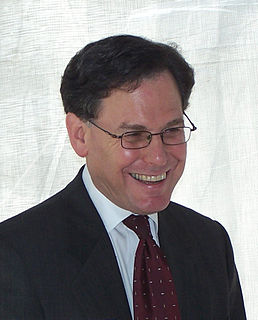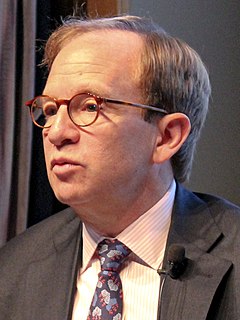A Quote by Sidney Blumenthal
It was an absurd theory that by cutting taxes you would increase government revenues, because the growth of the economy would create an overflow of taxes that would fall into the government coffers.
Related Quotes
Arthur Laffer's idea, that lowering taxes could increase revenues, was logically correct. If tax rates are high enough, then people will go to such lengths to avoid them that cutting taxes can increase revenues. What he was wrong about was in thinking that income tax rates were already so high in the 1970s that cutting them would raise revenues.
The government taxes you when you bring home a paycheck.
It taxes you when you make a phone call.
It taxes you when you turn on a light.
It taxes you when you sell a stock.
It taxes you when you fill your car with gas.
It taxes you when you ride a plane.
It taxes you when you get married.
Then it taxes you when you die.
This is taxual insanity and it must end.
All taxes, except a 'lump-sum tax,' introduce distortions in the economy. But no government can impose a lump-sum tax - the same amount for everyone regardless of their income or expenditures - because it would fall heaviest on those with less income, and it would grind the poor, who might be unable to pay it at all.
The most absurd public opinion polls are those on taxes. Now, if there is one thing we know about taxes, it is that people do not want to pay them. If they wanted to pay them, there would be no need for taxes. People would gladly figure out how much of their money that the government deserves and send it in. And yet we routinely hear about opinion polls that reveal that the public likes the tax level as it is and might even like it higher. Next they will tell us that the public thinks the crime rate is too low, or that the American people would really like to be in more auto accidents.
The analysis in the era of Ronald Reagan and Margaret Thatcher was that government was interfering with the efficiency of the economy through protectionism, government subsidies, and government ownership. Once the government "got out of the way," private markets would allocate resources efficiently and generate robust growth. Development would simply come.
With a congressional mandate to run the deficit up as high as need be, there is no reason to raise taxes now and risk aggravating the depression. Instead, Obama will follow the opposite of the Reagan strategy. Reagan cut taxes and increased the deficit so that liberals could not increase spending. Obama will raise spending and increase the deficit so that conservatives cannot cut taxes. And, when the economy is restored, he will raise taxes with impunity, since the only people who will have to pay them would be rich Republicans.
The theory of government I was taught says that government provides benefits, primarily security, to the entire population. In return we pay taxes. But lately the government has been a distributor of special privileges, taking money from some and giving it to others. America is now about evenly split between those who pay income taxes and those who consume them.

































